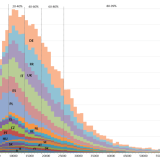
Mercados laborales integradores que funcionen adecuadamente
El buen funcionamiento de los mercados de trabajo constituye un requisito previo para aprovechar plenamente el potencial de generación de empleo de la economía a medida que esta emerge de la crisis económica y financiera. La crisis tuvo consecuencias muy diversas para el mercado laboral en los distintos Estados miembros de la UE, y algunos grupos como los jóvenes y las personas con bajo nivel educativo se vieron afectados con especial dureza. El rápido cambio estructural en curso plantea asimismo nuevos retos en lo que se refiere a posibles escaseces de mano de obra y desajustes de las competencias en distintos sectores y regiones.
La principal herramienta de la UE para promover el empleo y la integración social es el Fondo Social Europeo, que ayuda a los ciudadanos a conseguir un empleo, integra a los desfavorecidos en la sociedad, y garantiza unas oportunidades de vida más justas para todos. Existe asimismo una legislación europea de amplio alcance que regula los derechos de los trabajadores en el mercado laboral. Por otra parte, en abril de 2017, la Comisión Europea presentó el Pilar europeo de los derechos sociales. Se basa en la política social y laboral de la UE, y la complementa, con el fin de orientar las políticas emprendidas en otros ámbitos esenciales para el adecuado funcionamiento y la equidad de los mercados laborales y los sistemas de bienestar social.
- Comisión Europea: Fondo Social Europeo
- Comisión Europea: Hacia un pilar europeo de derechos sociales




















